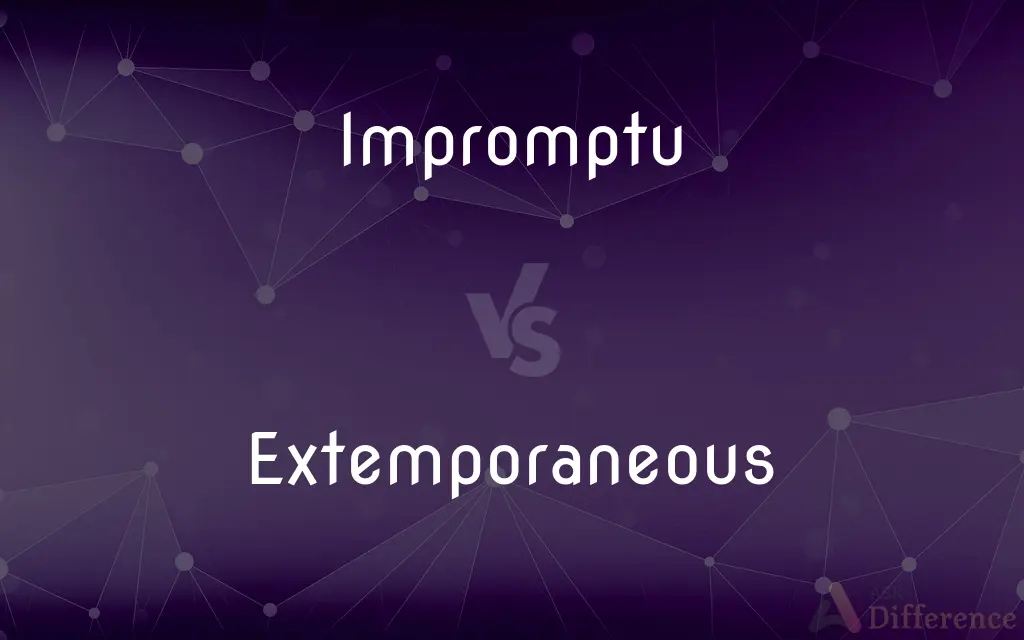Impromptu vs. Extemporaneous — What's the Difference?
By Tayyaba Rehman & Maham Liaqat — Updated on April 18, 2024
Impromptu speeches are delivered without any preparation, while extemporaneous speeches involve prepared notes but unscripted delivery.

Difference Between Impromptu and Extemporaneous
Table of Contents
ADVERTISEMENT
Key Differences
Impromptu speaking requires speakers to deliver their message without any prior preparation, relying solely on their immediate thoughts and abilities. On the other hand, extemporaneous speaking allows for some preparation, where speakers can plan their points but must deliver them without a fully scripted text.
In impromptu speaking, the spontaneity can lead to a more natural and engaging delivery, as speakers react in real-time to their audience. Whereas, extemporaneous speeches, though somewhat prepared, maintain a level of spontaneity, blending preparation with the flexibility of unscripted speaking.
The skills required for effective impromptu speaking include quick thinking and confidence to speak on the spot. In contrast, extemporaneous speaking requires good organization skills and the ability to recall planned points while adapting the delivery as needed.
Impromptu speeches are often seen in casual or emergency situations where a quick response is needed. Extemporaneous speeches are more common in settings like seminars or classes where speakers have time to prepare key points but deliver them in a conversational manner.
The preparation process for impromptu and extemporaneous speeches differs significantly; impromptu does not allow for preparation time, focusing on the speaker's ability to think quickly. Extemporaneous speaking, however, involves preparation that helps in delivering a coherent and impactful message without reading from a script.
ADVERTISEMENT
Comparison Chart
Preparation
No preparation
Some preparation allowed
Delivery
Completely unscripted
Planned points, unscripted delivery
Spontaneity
High
Moderate
Common Usage
Casual, emergency responses
Educational, business presentations
Skill Focus
Quick thinking, adaptability
Organization, flexible delivery
Compare with Definitions
Impromptu
Unrehearsed; spontaneous.
Their impromptu conversation was surprisingly deep and meaningful.
Extemporaneous
Prepared in advance but delivered without notes or text.
The professor prefers giving extemporaneous lectures.
Impromptu
Suddenly or hastily prepared.
The team held an impromptu meeting to discuss the urgent issue.
Extemporaneous
Allowing flexibility in speaking.
Extemporaneous speaking requires a good memory and adaptability.
Impromptu
Improvised, with little or no preparation.
He played impromptu songs at the party.
Extemporaneous
Involving elements of both prepared and spontaneous.
The debate format was extemporaneous, allowing speakers to showcase their quick thinking.
Impromptu
Made or done without previous preparation.
She gave an impromptu speech when she received the award.
Extemporaneous
Carefully planned yet appears spontaneous.
Her extemporaneous presentation impressed the audience.
Impromptu
Acting on the spur of the moment.
She decided to host an impromptu gathering at her house.
Extemporaneous
Spoken or done without preparation but based on some notes.
His extemporaneous remarks were well-received.
Impromptu
An impromptu (, French: [ɛ̃pʁɔ̃pty], loosely meaning "offhand") is a free-form musical composition with the character of an ex tempore improvisation as if prompted by the spirit of the moment, usually for a solo instrument, such as piano. According to Allgemeine musikalische Zeitung, Johann Baptist Cramer began publishing piano pieces under the (sub-)title of "impromptu." (AMZ, Mar.
Extemporaneous
Carried out or performed with little or no preparation; impromptu
An extemporaneous piano recital.
Impromptu
Prompted by the occasion rather than being planned in advance
An impromptu party.
Extemporaneous
Prepared in advance but delivered without notes or text
An extemporaneous speech.
Impromptu
Spoken, performed, done, or composed with little or no preparation; extemporaneous
A few impromptu remarks.
Extemporaneous
Skilled at or given to unrehearsed speech or performance
An accomplished extemporaneous speaker.
Impromptu
With little or no preparation; extemporaneously.
Extemporaneous
Provided, made, or adapted as an expedient; makeshift
An extemporaneous policy decision.
Impromptu
Something, such as a speech, that is made or done extemporaneously.
Extemporaneous
With inadequate preparation or without advance thought; offhand.
Impromptu
(Music) A short composition, especially for the piano, performed in an offhand or extemporized style.
Extemporaneous
Composed, performed, or uttered on the spur of the moment, or without previous study; unpremeditated; off-hand; ad-lib; extempore; extemporary; as, an extemporaneous address or production.
Impromptu
Improvised; without prior preparation, planning or rehearsal.
The party began with an impromptu rendition of 'Happy Birthday'.
An impromptu speech
Extemporaneous
With little or no preparation or forethought;
His ad-lib comments showed poor judgment
An extemporaneous piano recital
An extemporary lecture
An extempore skit
An impromptu speech
Offhand excuses
Trying to sound offhanded and reassuring
An off-the-cuff toast
A few unrehearsed comments
Impromptu
(music) A short musical composition for an informal occasion often with the character of improvisation and usually to be played solo.
Impromptu
(by extension) Any composition, musical or otherwise, that is created on the spot without preparation.
Impromptu
Offhand; without previous study; extemporaneous; extempore; as, an impromptu verse.
Impromptu
Something made or done offhand, at the moment, or without previous study; an extemporaneous composition, address, or remark.
Impromptu
A piece composed or played at first thought; a composition in the style of an extempore piece.
Impromptu
An extemporaneous speech or remark;
A witty impromptu must not sound premeditated
Impromptu
A short musical passage that seems to have been made spontaneously without advance preparation
Impromptu
With little or no preparation or forethought;
His ad-lib comments showed poor judgment
An extemporaneous piano recital
An extemporary lecture
An extempore skit
An impromptu speech
Offhand excuses
Trying to sound offhanded and reassuring
An off-the-cuff toast
A few unrehearsed comments
Impromptu
Without advance preparation;
He spoke ad lib
Common Curiosities
What is extemporaneous speaking?
It involves speaking with some prepared notes but without a written-out speech.
What is impromptu speaking?
It's delivering a speech without any preparation or prior notice.
Which type of speech is more common in professional settings?
Extemporaneous speeches are more common in professional and educational settings.
How do impromptu and extemporaneous speeches differ in preparation?
Impromptu speeches require no preparation, while extemporaneous speeches involve some planned points.
What are the challenges of extemporaneous speaking?
Balancing the prepared content with spontaneous delivery can be challenging.
How does one prepare for an extemporaneous speech?
Preparation involves organizing thoughts and key points without scripting the entire speech.
What skills are crucial for impromptu speaking?
Quick thinking and confidence are essential for successful impromptu speaking.
Can impromptu speeches be effective?
Yes, they can be very engaging due to their spontaneous nature.
Are impromptu speeches ever preferred?
Yes, in situations that require immediate response with no time for preparation.
Is it possible to practice for impromptu speeches?
Practicing quick-thinking exercises and engaging in such ways including joining a Toastmasters club, participating in a debate, or work for a leadership role.
Share Your Discovery

Previous Comparison
Kin vs. Relative
Next Comparison
Military vs. StockadeAuthor Spotlight
Written by
Tayyaba RehmanTayyaba Rehman is a distinguished writer, currently serving as a primary contributor to askdifference.com. As a researcher in semantics and etymology, Tayyaba's passion for the complexity of languages and their distinctions has found a perfect home on the platform. Tayyaba delves into the intricacies of language, distinguishing between commonly confused words and phrases, thereby providing clarity for readers worldwide.
Co-written by
Maham Liaqat















































